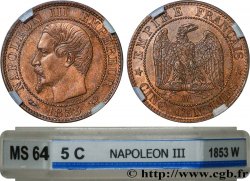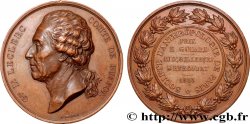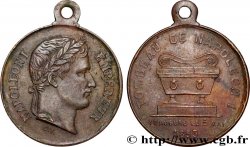fme_741830 - SECOND EMPIRE Médaille, 2e classe, Exposition de Dijon
Not available.
Item sold on our e-shop (2023)
Price : 150.00 €
Item sold on our e-shop (2023)
Price : 150.00 €
Type : Médaille, 2e classe, Exposition de Dijon
Date: 1858
Mint name / Town : 21 - Dijon
Metal : silver
Diameter : 56,5 mm
Orientation dies : 12 h.
Engraver Barre
Weight : 64,07 g.
Edge : lisse + main ARGENT
Puncheon : main indicatrice (1845-1860) et ARGENT
Coments on the condition:
Exemplaire ayant été nettoyé, des frottements dans les champs et des concrétions blanches dans le creux de certains reliefs. Présence de quelques rayures
Obverse
Obverse legend : NAPOLÉON III - EMPEREUR.
Obverse description : Tête nue de Napoléon III à gauche, signé : BARRE.
Reverse
Reverse legend : INDUSTRIE BEAU-ARTS AGRICULTURE - * 1858 * // EXPOSITION / DE DIJON / - / MÉDAILLE DE 2.ME CLASSE.
Reverse description : Légende circulaire puis en 5 lignes horizontales.
Commentary
Exemplaire non décerné
L’Exposition internationale de 1858 s'est déroulée dans la ville française de Dijon (Côte-d'Or) afin de promouvoir les Beaux-arts, l'industrie et l'agriculture. L'Exposition a été inaugurée le 8 juin 1858 par Jean-Baptiste Philibert Vaillant et s'est tenue jusqu'à septembre 1858 place d'Armes (actuelle place de la Libération) au cœur de la capitale des ducs de Bourgogne à l'initiative du maire de la ville Théodore Michel Vernier, président de la commission. Elle devait promouvoir les Beaux-arts, l'industrie et l'agriculture et a ainsi exposé objets et produits dans les salles de l'ancien palais des Ducs de Bourgogne et dans les annexes de la La place d'Armes, de la place du Théâtre et de la place des Ducs. Une valse pour piano La Dijonnaise a été spécialement écrite pour l'événement par madame Alexandre Bataille et dédiée aux membres de la commission de l'exposition.
Unawarded example The International Exhibition of 1858 took place in the French city of Dijon (Côte-d'Or) to promote the Fine Arts, industry and agriculture. The Exhibition was inaugurated on June 8, 1858 by Jean-Baptiste Philibert Vaillant and was held until September 1858 at Place d'Armes (now Place de la Libération) in the heart of the capital of the Dukes of Burgundy at the initiative of the city's mayor Théodore Michel Vernier, president of the commission. It was intended to promote the Fine Arts, industry and agriculture and thus exhibited objects and products in the rooms of the former palace of the Dukes of Burgundy and in the annexes of the Place d'Armes, the Place du Théâtre and the Place des Ducs. A piano waltz, La Dijonnaise, was specially written for the event by Mrs. Alexandre Bataille and dedicated to the members of the exhibition commission.
L’Exposition internationale de 1858 s'est déroulée dans la ville française de Dijon (Côte-d'Or) afin de promouvoir les Beaux-arts, l'industrie et l'agriculture. L'Exposition a été inaugurée le 8 juin 1858 par Jean-Baptiste Philibert Vaillant et s'est tenue jusqu'à septembre 1858 place d'Armes (actuelle place de la Libération) au cœur de la capitale des ducs de Bourgogne à l'initiative du maire de la ville Théodore Michel Vernier, président de la commission. Elle devait promouvoir les Beaux-arts, l'industrie et l'agriculture et a ainsi exposé objets et produits dans les salles de l'ancien palais des Ducs de Bourgogne et dans les annexes de la La place d'Armes, de la place du Théâtre et de la place des Ducs. Une valse pour piano La Dijonnaise a été spécialement écrite pour l'événement par madame Alexandre Bataille et dédiée aux membres de la commission de l'exposition.
Unawarded example The International Exhibition of 1858 took place in the French city of Dijon (Côte-d'Or) to promote the Fine Arts, industry and agriculture. The Exhibition was inaugurated on June 8, 1858 by Jean-Baptiste Philibert Vaillant and was held until September 1858 at Place d'Armes (now Place de la Libération) in the heart of the capital of the Dukes of Burgundy at the initiative of the city's mayor Théodore Michel Vernier, president of the commission. It was intended to promote the Fine Arts, industry and agriculture and thus exhibited objects and products in the rooms of the former palace of the Dukes of Burgundy and in the annexes of the Place d'Armes, the Place du Théâtre and the Place des Ducs. A piano waltz, La Dijonnaise, was specially written for the event by Mrs. Alexandre Bataille and dedicated to the members of the exhibition commission.








 Report a mistake
Report a mistake Print the page
Print the page Share my selection
Share my selection Ask a question
Ask a question Consign / sell
Consign / sell
 Full data
Full data









